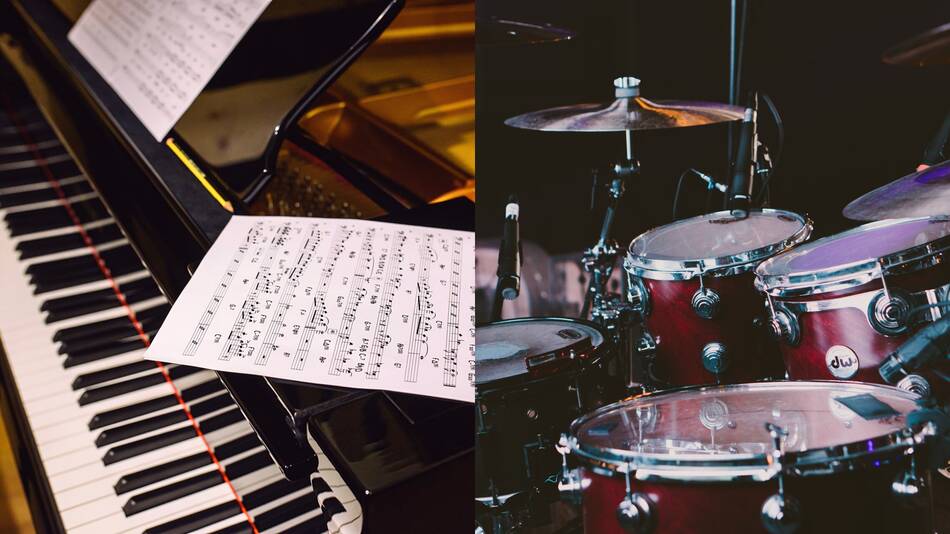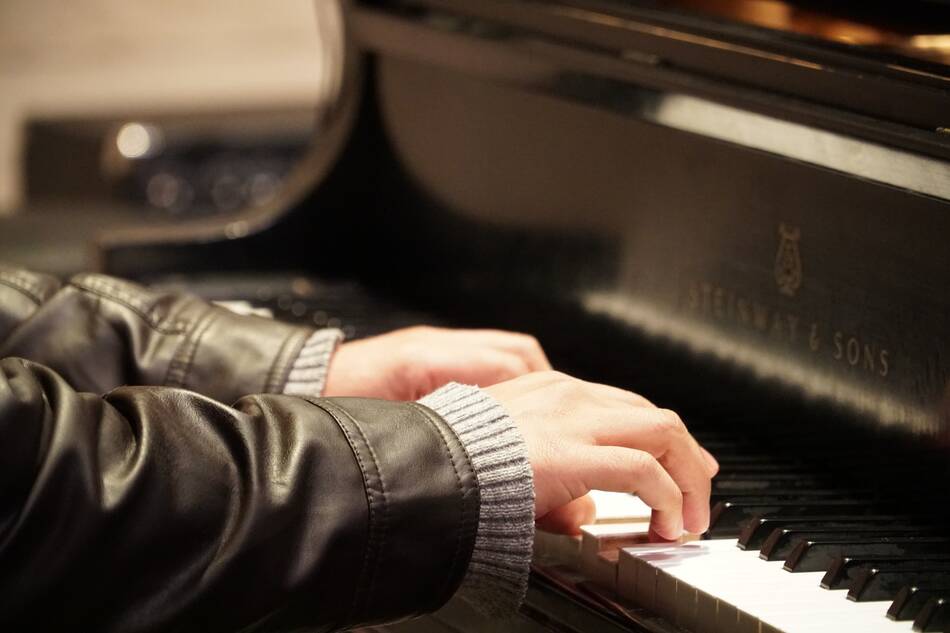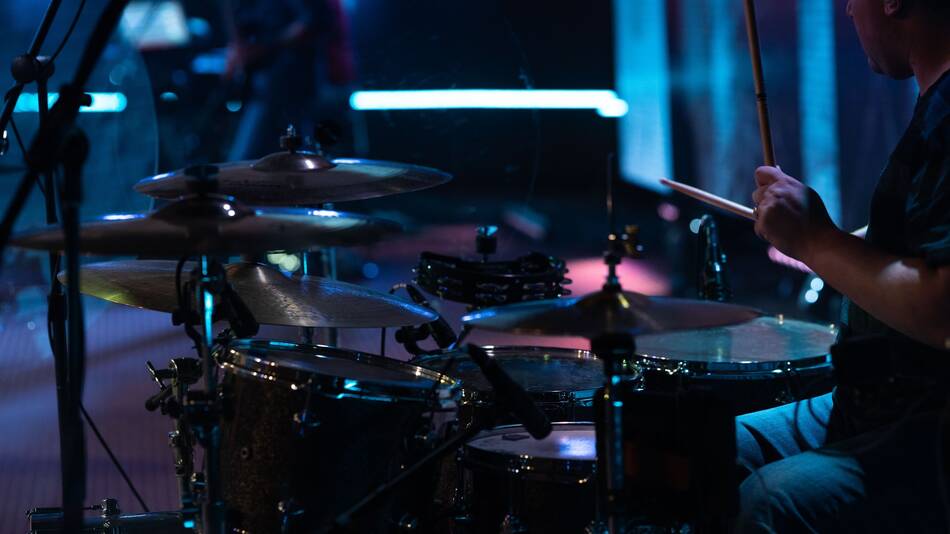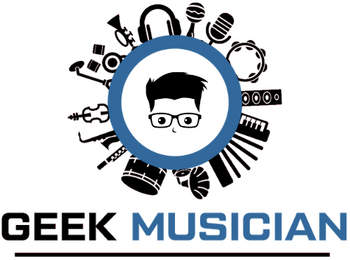
Picking up your first musical instrument to learn can be quite a daunting task. That’s because there are so many options to choose from. However, two of the most popular musical instruments we have today are the drums and the piano.
And if you are having a difficult time choosing between the piano and the drums, then this article is for you.
We’ll talk about the differences between the piano and the drums, the advantages of choosing the piano over the drums and vise versa, and I’ll help you decide which one of them you should choose. Without wasting much time, let’s get into it.
Table of Contents
Difference Between the Piano and the Drums
Although there are a few similarities between the piano and the drums, these are two completely different musical instruments.
One thing the piano and drums have in common is they are both classified as percussion instruments. Percussion instruments simply refer to instruments that make a sound by being struck or hit.
Inside the piano is a row of strings with different tensions. When you press a note on the piano, a hammer hits on the corresponding string, which vibrates the string to make a sound.
The harder you hit the note, the harder the hammer hits the string; hence, the louder the sound. This is why the piano is considered a percussion instrument, just as the drums.
Now let’s talk about the key differences between the piano and drums.
Firstly, the piano is considered a pitched instrument. This simply means it produces a musical note of one definite pitch when it is struck. Drums, on the other hand, are considered non-pitched instruments. That’s because drums produce multiple pitches when it is hit.
Another significant difference between the piano and the drums is how it is played.
The main body part required to play the piano is the fingers. Piano players train their fingers to have dexterity so that they can move them in unique ways to play the piano.
There are many practice routines piano players do to improve finger speed, muscle memory, and dexterity. The main muscles involved in playing the piano exist in the palms and forearms.
The feet are also involved in piano playing. They are used in controlling the pedals, mainly the sustain pedal. However, they don’t require as much development and attention as the fingers.
Playing the drums, on the other hand, involves the use of both the legs and arms. There are many drum rudiment exercises aimed towards improving hand patterns and coordination so that you play rhythmically and tastefully.
There are also a handful of drum coordination exercises that help improve your hands and legs’ coordination, which is crucial in playing drums.
So, yes. Although the piano and the drums may be classified as percussion instruments, the skill required to play them is totally different.
And the last difference between the piano is a melodic instrument. What do I mean by this?
The piano has many notes which can be played individually to make a musical melody, or you can play a couple of notes together to make a harmony. A pianist can play both the melody and harmony together to make a tune.
Drums, on the other hand, is a rhythmic instrument. The main focus of a drummer is to provide a rhythm, groove, or beat to the music. And also, they have to play in time. Drummers and bassists usually play the groove that makes you want to dance or nod your head when you are listening to music.
Although piano players can also play rhythmically in genres like funk or pop, they often play the melody and harmony in a song without any rhythm.
Advantages of Playing Piano over Drums

Now let’s talk about some of the benefits of playing piano over drums.
1. You can practice without disturbing
If you decide to learn piano, chances are you are going to purchase a digital piano. And the great thing about digital pianos is that they all have headphone jacks. This means you can plug a headphone into the piano directly and listen to your play.
This means you can practice on a digital piano, for hours, at any time of the day, without disturbing anyone at your house or your neighbors.
Also, many beginner digital pianos like the Alesis Recital 88-Key Digital Piano (on Amazon) have built-in speakers that are not too loud to be noisy. So you can get away with practicing with these built-in speakers without disturbing anyone.
This is not the case for drums at all. That’s because drums are a very noisy instrument. Practicing on a drum kit can be very disturbing, especially if you are a beginner. If you live in a quiet neighborhood or in an apartment, you might not be allowed to practice your drums at all.
That’s because you may end up disturbing your family and everyone that lives around you. For this reason, many drummers don’t get to practice for many hours and on a consistent basis. This can definitely stall your progress of becoming an excellent drummer.
The drum’s noise can be reduced by using drum mute pads like the Evans Soundoff Drum Mutes (on Amazon). These pads damp the sound of the drums and reduce their loudness drastically. However, these come at a cost, and they don’t totally kill the drum’s noise. But it’s helpful.
The point I’m trying to make is you won’t have any issue with noise when you decide to go with a piano.
2. Piano exposes you to music theory
When you start taking piano lessons, one of the most important concepts you’ll be introduced to is music theory. Music theory is simply a set of rules or structure that shows you the different possibilities of music.
You’ll get to learn about the different chord structures and ways to combine them to make music. Knowledge in music theory would be very helpful if you decided to write your own songs, be a music producer or collaborate with different artists. That’s because it will help you communicate your ideas better with other musicians.
Also, if you ever decide to learn another musical instrument like the guitar, bass, violin, or any pitched instrument, music theory will come in very handy. That’s because the same theories apply.
Music theory is not required to be an excellent drummer. For this reason, many drum lessons don’t include music theory. And honestly, this is a big advantage piano players have over drummers.
3. It’s easier to transport a digital piano
Another advantage piano players have over drummers is that it is much easier to take your digital piano along with you everywhere you go. This is important because once you become an excellent pianist and you start playing gigs, you’ll be taking your instrument along with you.
And if your 88-key digital piano is too bulky to be transported, you can purchase a 61-key lightweight keyboard that is extremely easy to move around.
Drummers usually have a hard time moving their instruments because of how bulky they are. Many drummers rely on whatever drums they will get at the venue they are playing. And sometimes, those drums are not in great condition.
4. Pianists can play in a band or perform as a solo artist
Another great thing about being a piano player is, you can play in a band as well as perform solo.
For instance, the pianist is one of the key components in a jazz, blues, and rock band. Pianists can also play in a cover band or perform with just a vocalist. A pianist can also be the lead musician in a piano concerto.
However, piano players can also perform alone to an audience. There are many concerts where only piano players perform. If you decide to be a concert pianist, there are many piano pieces available for you to perform. If you become skilled enough to write your own compositions, you can perform them for an audience as well.
This is not the case for drummers. Drummers have to play in a band. They can never play to an audience alone. The only time a drummer may perform to an audience is at drum workshops where the drummer is essentially teaching or showcasing his skills to other drummers or musicians.
I’m yet to see drummers performing solo to mainstream non-musicians.
5. Piano is an excellent instrument for singers and songwriters
If you love singing or writing songs, the piano is one of the best instruments for you. That’s because when you learn piano, you can accompany yourself with the piano as you sing or write. Also, your knowledge of music theory will help you become a better singer and songwriter.
Another instrument that is great for singers and songwriters is the guitar. Many singers and songwriters play the piano, guitar, or both.
In essence, the piano can be a very helpful instrument over the drums if you like singing or writing songs.
6. You don’t have to replace worn-out drum parts
One thing that sucks about drums is you have to replace worn-out parts from time to time. Parts like the drumheads, cymbals, and drumsticks degrade over time, and after a while, they don’t sound their best.
So you have to replace them once they degrade, and this incurs an extra cost. It can be a pain if you are still learning the drums and not making any money from it to buy these replacement parts.
This is not the case for the piano. There are no piano parts that degrade and require replacement. The only thing you may have to replace after some years is sustain pedals. And even for that, unless you buy cheap sustain pedals.
If you stick to sustain pedals with excellent build quality, such as the M-Audio SP2 Pedal (on Amazon), you won’t have to worry about buying a new pedal for a long time.
Advantages of Playing Drums over Piano

Here are the benefits of learning and playing drums over the piano.
1. You can master drums in a shorter period
It takes many years and several hours of practice to be considered an excellent piano player. That’s because there are twelve keys on the piano that you need to master and play proficiently. Your finger dexterity, speed, and hand independence must be top-notch. And also, you need to be good at improvisation.
This can take years of practice to get to that level. I’m in no way saying you have to play like a virtuoso to be considered an excellent pianist. But to be a pianist in demand requires you to practice a lot.
However, if you choose to learn drums, you can be an excellent drummer in a relatively shorter period. Once you dedicate your first couple of months (say six months) just learning drum rudiments, hand and leg coordination exercises, and other basic techniques, you are well on your way to becoming an excellent drummer.
Most of the time, a drummer is not required to improvise or play solo. A drummer’s main purpose is to provide the rhythm, give the pulse and the groove to a piece of music. And although mastering that may take some time and work, you can pick it up at a shorter period, and in no time, you will be called for drum gigs.
2. You can play drums without music theory or reading music
As I already talked about, music theory is a very useful concept. However, it takes time and a lot of practice to master it. This can stall the learning progress of a piano player. However, it is not required to be a drummer.
Many drummers play by ear or feel. They learn whatever they have to play mostly by ear.
Also, many pianists, especially classical and jazz pianists, rely heavily on sheet music to perform. And the skill of reading sheet music isn’t an easy task at all. To be able to look at the sheet, read and play it at the same time takes a lot of time and effort.
And it’s true; there is sheet music written for the drums as well. But many drummers can learn their drum parts just by listening. And they are also allowed to play by feel.
For this reason, there is not a lot of pressure on drummers to learn to read sheet music unless they are playing for an orchestra or a jazz band that plays very difficult pieces that require accuracy.
3. Drummers are more in demand than piano players
The setback of drums makes solid drummers in demand. What do I mean by this?
As we have already discussed, drums are loud. And this makes many beginners want to learn a musical instrument choose other instruments over the drums. My point is, there are not many people learning the drums.
Secondly, because drums are loud instruments, those who even decide to still learn it don’t get to practice for many hours because they will disturb everyone in the house and their neighbors.
So many drum learners don’t progress as fast as they should. For this reason, there are not many solid drummers available, compared to guitarists or pianists.
So, upon all these setbacks and you still manage to become an excellent and solid drummer, you’ll be in demand. There are many bands that are looking for drummers who can play to a metronome, play to a song without overplaying, and have a solid groove.
Exceptional drummers are always in demand by artists on tour. For a pianist to be in demand, they’ll have to learn other keyboard instruments like the Rhodes, organ, synthesizers, and more. And they need to have solid knowledge in sound design, music technology, and more. In essence, they need to be versatile.
In today’s day and age, being a piano player only will only get you a few gigs, and you won’t be in high demand. Unless, of course, you are a very exceptional pianist.
Is it easier to learn piano or drums?
The drums and piano are two musical instruments that require different skills to play. As we have already talked about, playing the piano makes use of your ten fingers, while the drums require your hands and legs. But which one is easier?
The drums are an easier musical instrument for beginners to start with compared to the piano. That’s because, after a few drum lessons, you’ll be able to play some basic drum grooves. Also, it takes a shorter period to master the drums than the piano. However, the drums are just a difficult instrument to master as the piano.
It takes only a few drum lessons to be able to play basic grooves, for instance, the basic rock rhythm. And there are many grooves beginners can learn when they start out.
Once you are able to play these basic grooves as a beginner, you are motivated even more to learn and master the drums.
Most piano teachers will teach you the names of the keys and how to identify them in your first couple of lessons. And although this is very important, it can be quite a turnoff for beginners who want to start playing something on the piano immediately.
To master both the piano and the drums is quite difficult, to be honest.
You need to put in the work and practice the drums for many hours to get your hands and legs coordination right, practice rudiments and techniques, learn to play with the metronome, how to play different time signatures, and more. All these skills require consistent practicing on the drums to master.
The same thing applies to the piano. To master piano requires you to practice in all twelve keys, the different scales using the right fingering, learn chords, modes, comping, improvisation, riffs, and runs. And there are even more techniques to learn, depending on the genre of music you choose to play. Mastering all these requires some commitment on your end to practice regularly.
However, as I mentioned earlier, although mastering the piano and drums are all difficult, it takes a relatively shorter period to master the drums compared to the piano.
This makes the drum, overall, an easier musical instrument to learn than the piano.
However, something you should note is how easy or difficult an instrument is to learn ultimately depends on the person learning. What do I mean?
Some people are naturally inclined or predisposed to playing the drums. This category of people will find it much easier learning the drums because they are naturally “gifted” with playing the drums. So a little effort on their end goes a long way.
Similarly, there are some people who are predisposed to playing the piano and will find it easier learning it.
Piano or Drums: Which one should you learn?
There is no definite answer to which instrument to learn. That’s because we all have different interests and abilities. So here are some things you should consider that will help you decide whether to learn to play the piano or drums.
1. Does the piano or drums excite you?
One thing that can motivate you to keep practicing a musical instrument is how excited and passionate you are about it.
If you enjoy classical piano, a piano player improvising, the soft piano ballads, the piano and keyboard parts of a song, the attitude and movements of a piano player as they play, or even just listening to the sound of the piano, you should definitely consider learning the piano.
However, if you enjoy watching the hard-hitting drummers in a metal band, the hip-hop grooves played by drummers, the chops played by gospel drummers, how energetic drummers are when they are playing, or the look and feel of a drum kit, you should consider learning the drums.
Also, take a look at your favorite musicians or bands. Does your favorite musician or band member play the piano or drums? This will help you decide the choice of instrument to learn.
2. The demand for drummers or piano players in your location
If you are looking to make money being a musician, you should definitely consider the demand for drummers and pianists in your area.
Ask other musicians, music producers, or find out from friends where you live about the demand for drummers and piano players.
Are many bands looking for a drummer or a piano player? What about churches? Can you get a part-time job playing drums or piano at churches in your area? What about recording sessions? Is there room for a new session drummer or pianist where you live?
This is important because you don’t want to spend years mastering a musical instrument and end up not being booked for gigs.
3. Try learning both the piano and drums and choose one
If you have access to both the piano and drums, I’d recommend taking a few lessons on both instruments. After taking a couple of lessons on both instruments, you’d figure out which one you enjoy playing the most. You can then focus on learning that.
Before you consider hiring a piano or drum teacher or buying a beginner course, make use of some of the beginner piano and drum lessons on YouTube. Once you decide which instrument you want to learn, you can sign up for a piano class or drum class.
Should you learn piano or drum first?
Perhaps you don’t want to choose, and you are interested in learning both instruments. That’s great. However, it’s a good idea to learn one first, and you can move on to the next once you gain momentum on the first instrument.
But which one should you learn first? Piano or drums?
If you decide to learn both instruments, I recommend you learn the piano first before the drums.
That’s because learning the piano will help you understand music theory. This means you’ll be able to communicate with other musicians who play pitched instruments, collaborate with songwriters and singers, and overall, you’ll understand and appreciate music more. And this makes you a better musician.
Believe it or not, learning the piano before the drums will also make you an excellent drummer. That’s because you will be able to play the drum in a way that contributes to the music.
And you don’t need to master the piano before you begin learning the drums. Once you understand music theory and have decent piano playing skills, you can start taking drum lessons.
Conclusion
Obviously, both the drums and the piano have their benefits and their shortcomings. But the most important thing is to choose one that you enjoy playing and don’t feel stressed when you’re practicing.
Playing a musical instrument should be an enjoyable experience. This makes you want to practice to become better and better. So whether you choose to learn the piano or drums, make sure you are excited to play it at the end of the day.

Hi, I’m Raymond. A keyboard player, music producer, and writer. And I’m also the founder of this blog. As someone who has been working with several audio and music equipment and different musicians for many years, my goal is to answer all your questions on music and equipment, as well as the latest music software and technology. For more info, check out my about me page
